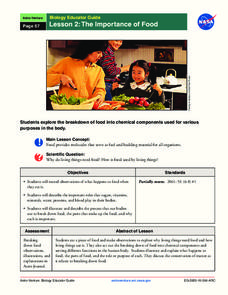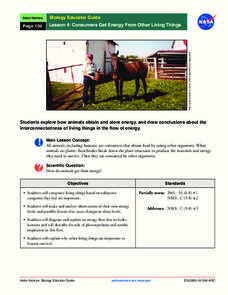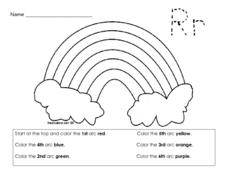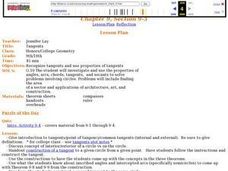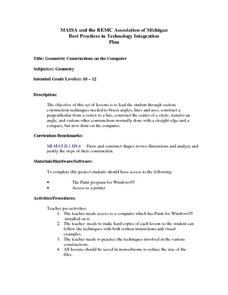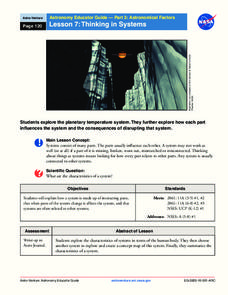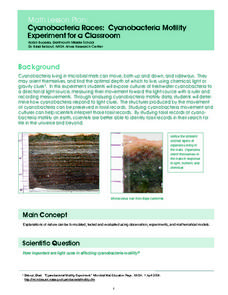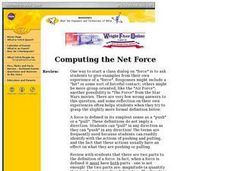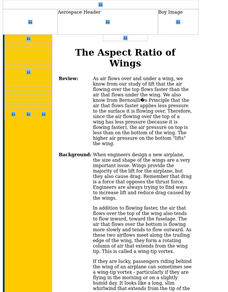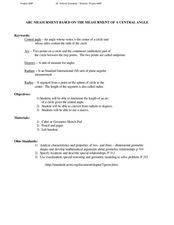NASA
The Cycle of Matter
An educational lesson focuses on the idea of conservation of matter through a demonstration of the water cycle, a discussion of digesting food, and the path of carbon and oxygen atoms as they change form.
NASA
Biology Training Module
Are you a koalafied biologist? The lesson begins with research about human survival and our ecosystem. Then, an online training module simulates the effects of changes to the plants and animals in an ecosystem. Finally, scholars research...
NASA
The Importance of Food
Pupils make observations while eating food. They act out the process of food breaking down in the body and the roles of various chemical components, such as sugar and protein. It concludes with an activity illustrating the process and a...
NASA
Producers Make Their Own Food
During an inquiry-based lesson, scholars decide which variable to test and then design an experiment to determine the needs of producers. After two weeks, they complete a full analysis and research paper.
NASA
Consumers Get Energy From Other Living Things
How do plants and animals get their food? Learn about where energy comes from, how animals store energy, and aerobic respiration, in a lesson that allows scholars to diagram energy flows.
NASA
Biology Training Conclusion
Gravity is just one consideration when determining human habitability on a new planet. The lesson connects four different units and starts with connecting the various systems: planetary systems, human body systems, etc. After scholars...
Curated OER
The Letter R-Rainbow Colors: Color and Number Practice
For this letter/color worksheet, students color arcs of a rainbow as directed. Worksheet is designed for counting and color practice, student directions focus on coloring the number of an arc a certain color.
Curated OER
Math: Tangents
Students discover how to recognize tangents and how to use their properties. They investigate and use the properties of angles, arcs, chords, tangents, and secants. Students use two tangents and the properties of similar triangles to...
Curated OER
Best Practices in Technology Integration
Students go through various construction techniques needed to bisect angles, lines and arcs, construct a perpendicular from a vertex to a line, construct the center of a circle, transfer an angle, and various other constructions normally...
Curated OER
Kinematics of the Planar Continuum Snake Robot
Students calculate the length of an arc that surrounds an angle at the center of a circle of radius. In this kinetic equations instructional activity students complete a lab and solve a kinematic equation.
NASA
Astronomy Mission Module
Yes, scientists say, there is other life in our solar system! And the best place to look is on Europa, a moon of Jupiter. Here, learners mimic the techniques scientists use to gather information about objects in our solar system, write...
NASA
States of Matter
Water, one of the basic needs of humans, is found in all three states of matter on Earth; no other planet—that we know of—possesses this quality. Here is a unit that allows learners to explore through experimentation what it...
Curated OER
Numerical Methods of Integration
Students review Riemann Sums with rectangles, used to approximate the area under a curve. They listen as the teacher introduces the Trapezoidal Rule to approximate the area under a curve. Students use Simpson's Rule to find the area...
Curated OER
Discussion Sheet 10: Improper Integrals
In this improper integral worksheet, students compute improper integrals, they determine finite improper integrals, and find the area of a region bounded by graphs. Students compute the arc length of a curve on the indicated interval. ...
Curated OER
Cyanobacteria Races: Cyanobacteria Motility Experiment for a Classroom
Students experiment to determine the effect of light on cyanobacteria movement. They graph the data of the experiment for further analysis. They watch a time-lapse video of cyanobacteria motility at a NASA website.
Curated OER
Graphing the Four Forces
Using the Cartesian coordinate system, future flight experts plot points to determine whether or not an airplane will fly. With the four forces of weight, lift, drag, and thrust represented in different quadrants, your physics learners...
Curated OER
Computing the Net Force
Adorable little stick figures push and pull a cart of blocks to explain the push and pull of forces. Future physicists then define force and identify it in different situations on the worksheet that follows. Concepts covered include...
Curated OER
Arctica - An Interactive Mystery
Rumours of illness, poisoning, and madness - a ship disappears without a trace! Read this interactive science story and use deductive reasoning skills to solve a mystery. This engaging resource gives science stars a chance to practice...
Curated OER
Interactive Biogeochemical Cycle
Young scholars gain understanding of several of the biogeochemical processes in microbial mats. They acquire knowledge of the different roles of organisms in a microbial mat ecosystem. They understand how microbial mat ecosystems...
NASA
Introduction to Astronomy
Welcome to your new job as an astrophysicist, astrobiologist, engineer, or research scientist at NASA. Your job is to search for alien life in our solar system! Throughout a unit of activities, learners search the galaxy through...
Curated OER
Flying with Pythagoras
A lengthy narrative about Pythagoras and his students precedes an activity in which your young mathematicians practice using the Pythagorean theorem to solve three problems about flight and distance. Answers are provided.
Curated OER
The Aspect Ratio of Wings
Junior engineers examine aspect ration in airplane wings. Using the length and width of two differetn wings, they calculate the aspect ratios and compare drag rankings. An engineering or space science class would benefit from this...
J. Hines, Ed Prgms Intern
Comma Usage
Sometimes it feels like young writers just place commas as they please! Ensure that your pupils uses these important punctuation marks properly by requiring them to study the information here and complete the grammar exercise....
Curated OER
Measurement of a Central Angle
Students calculate the measurement of a central angle. In this geometry lesson, students identify properties of circles. They use Cabri software to create and analyze graphs.
Other popular searches
- Arcs and Chords
- Central Angles and Arcs
- Arcsin
- Intercepted Arcs
- Arcs Chords Secant Tangent
- Arcs Angles
- Arcs and Angles
- Geometry Circles Arcs
- Arcs Chords
- Circles Arcs and Chords
- Circles Arcs
- Major Arcs


